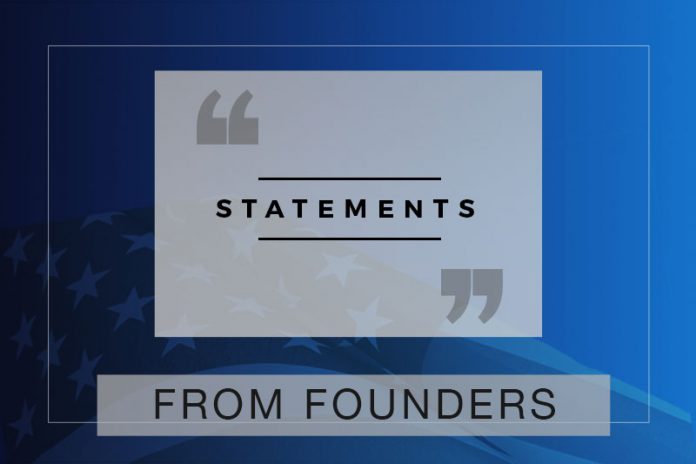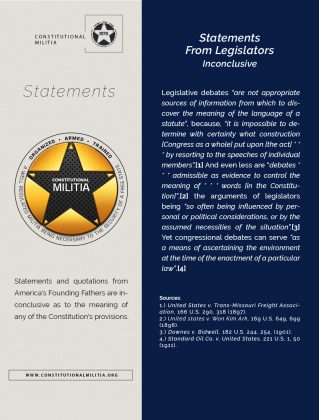Last Updated on March 8, 2023 by Constitutional Militia
Statements and Quotations: Inconclusive
The rule of legal construction that WE THE PEOPLE employed in the late 1700s (and must, absent amendment of the Constitution, continue to use today) is “original intent” or “original meaning”. “Original intent” does not attempt to draw from the personal, perhaps idiosyncratic, beliefs of the individual framers who participated in the federal convention of 1787 the meaning of constitutional provisions. Because, as with any legislation, “it is impossible to determine with certainty what construction” the framers as a whole put upon—or, more importantly should have put upon—the Constitution, simply “by resorting to the speeches of individual[s],”[1] those being “so often influenced by personal or political considerations, or by the assumed necessities of the situation.”[2]
Statements From Individual Framers and Founding Patriots: Inconclusive as to the Meaning of any Constitutional Provision
A procedure popular among defenders of the Second Amendment who are attempting to define “the right of the people to keep and bear Arms” is to assemble a mass of quotations on the subject from various Founding Fathers. This, however, is a somewhat unreliable method, because it begs the question, “Without an independent, objective definition, how can one know whether any particular Founding Father’s statement is correct?”[3]
True, people often talk loosely about “the Founding Fathers’ intent” as expressed in the Constitution. But what they really mean (or should mean), is the Constitution’s intent, as expressed in its language. This language is definitive, because it constitutes the most formal and objective statement of the Framers’ and We the People’s intent: namely, “the supreme Law of the Land.” Thus, rather than relying on merely anecdotal evidence and perhaps fallible personal opinions to determine what “the Militia of the several States” means, one must look to the relevant laws: the Militia Acts of the Colonies and independent States during the pre-constitutional period, from the mid-1600s to the late 1700s. These Acts provide the best historical–and, more importantly, legal–evidence of the principles on which the Militia were formed and operated. Not only that, The Militia Acts display a remarkable consistency–even unanimity–in these principles, from New Hampshire in the North to Georgia in the South, proving that the definition of “the Militia of the several States” is not some vague or plastic verbal formula that was and now can be manipulated for political purposes, but a concept with as much surety and fixity of meaning as any to be found in the Constitution.[4]
“Doubtless, the intention of the Congress which framed and of the States which adopted [a constitutional] Amendment must be sought in the words of the Amendment; and the debates in Congress are not admissible as evidence to control the meaning of those words.”[5]
Patriots should remember that only the Militia approach can serve the vital purpose of the Second Amendment, which is not to promote hunting, target shooting, or other “sporting” or “recreational” uses of firearms (although the Militia approach would protect these activities too), but instead is to arm “the people” so as to provide “the security of a free State” through “well regulated Militia.” By itself, an “individual right” to possess firearms cannot protect this country against the imposition of a police state by rogue public officials. For what good will arms in individuals’ hands prove to be against large-scale para-militarized police forces and other instruments of oppression, without thoroughgoing organization of those individuals and legal authority for their collective action in defense of their liberties? The Militia are the constitutional institutions that provide both—which is why the Second Amendment declares them to be “necessary to,” not simply useful let alone optional for, “the security of a free State.”






























